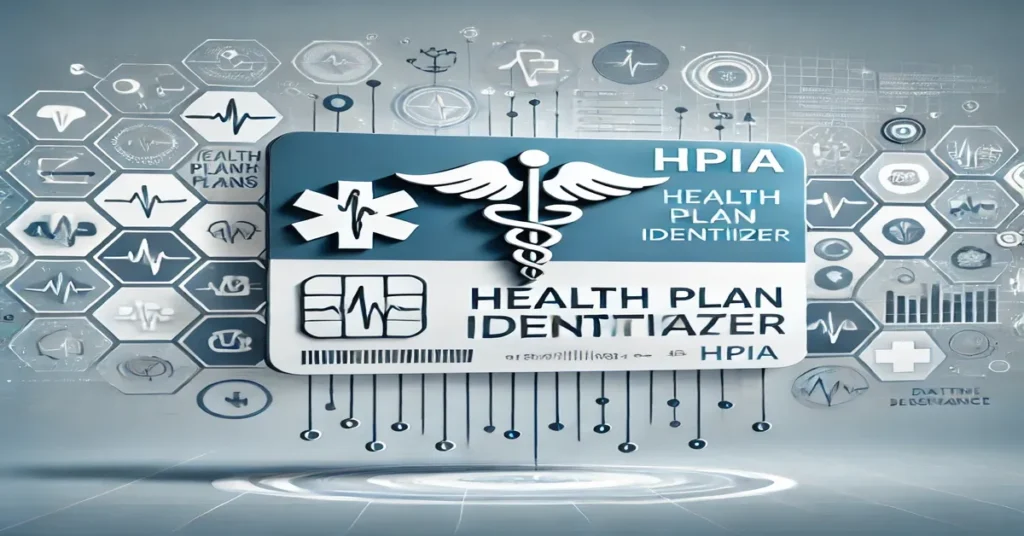The Health Plan Identifier (HPIA) is a crucial element in the modern healthcare system, designed to streamline the identification and management of health plans across the United States. Its primary purpose is to create a standardized method for tracking and managing various types of health insurance plans, improving efficiency and transparency in the healthcare industry. In this comprehensive guide, we’ll explore what HPIA is, its importance, how it works, and its impact on health plans, providers, and the insured.
What is HPIA?
The Health Plan Identifier (HPIA) is a unique, standardized identification number assigned to each health plan in the United States. This identifier is part of the Health Insurance Portability and Accountability Act (HIPAA) Administrative Simplification provisions, designed to reduce administrative burdens in the healthcare system. By assigning a unique identifier to each health plan, HPIA allows for easier tracking and verification of health plans during transactions such as claims processing, billing, and eligibility verification.
The HPIA system includes both large group health plans and self-insured health plans. The identifier itself is typically a 10-digit alphanumeric code that is issued by the Centers for Medicare & Medicaid Services (CMS). Each identifier is unique to ensure that there is no overlap or confusion between different plans, making the healthcare system more organized and efficient.
Why Was the Health Plan Identifier Created?
The creation of the HPIA was primarily driven by the need for a more streamlined and efficient healthcare administration process. Prior to the implementation of HPIA, health plan identification was often inconsistent and varied across different providers and organizations. This lack of standardization made it challenging for healthcare providers to manage patient claims, verify eligibility, and process payments.
The HPIA system addresses these issues by providing a standardized approach to health plan identification, improving the accuracy of transactions between health plans and healthcare providers. This results in fewer errors during claims processing, faster payment cycles, and an overall reduction in administrative costs for healthcare providers and insurers.
Key Objectives of HPIA
The Health Plan Identifier was created with several key objectives in mind:
- Streamlining Administrative Transactions: HPIA simplifies various healthcare transactions, including claims processing, billing, and eligibility verification. This standardization ensures that health plans are accurately identified during these processes, reducing errors and delays.
- Enhancing Data Exchange: The unique identifier system facilitates smoother data exchange between health plans, healthcare providers, and other stakeholders. This improves the overall quality and accuracy of data shared across the healthcare system.
- Reducing Administrative Burdens: By standardizing health plan identification, the HPIA’s system helps reduce the administrative burden on healthcare providers. This allows providers to focus more on patient care rather than spending time on managing complex administrative processes.
- Ensuring Compliance with HIPAA: HPIA helps ensure compliance with HIPAA’s Administrative Simplification provisions, which are aimed at improving the efficiency and effectiveness of the healthcare system. This compliance is essential for avoiding penalties and maintaining a smooth operation within the healthcare industry.
How Does HPIA Work?
The implementation of HPIA involves several steps, from the assignment of identifiers to their usage in healthcare transactions. Here’s a closer look at how the system works:
- Application for HPIA: Health plans, including self-insured plans, must apply for a Health Plan Identifier through the CMS. The application process requires providing detailed information about the health plan, such as its type, structure, and the covered populations.
- Issuance of HPIA: Once the application is approved, the CMS issues a unique 10-digit identifier for the health plan. This identifier is then used in all relevant healthcare transactions involving the plan.
- Incorporation into Transactions: After receiving their HPIA, health plans must integrate the identifier into their administrative processes. This includes using the HPIA’s in electronic data interchange (EDI) transactions, claims submissions, and eligibility verifications.
- Verification and Updates: Health plans are responsible for keeping their information up to date with the CMS. If there are any changes in the plan’s structure, coverage, or other relevant details, the HPIA’s data must be updated to ensure accurate identification during transactions.
- Usage in Compliance and Reporting: HPIA is also used for compliance reporting under HIPAA. This helps in monitoring adherence to HIPAA standards and ensures that health plans are meeting the required regulatory benchmarks.
The Benefits of HPIA for Health Plans
The adoption of HPIA offers several benefits for health plans, including improved efficiency, better data management, and enhanced compliance. Here are some of the primary advantages:
- Simplified Claims Processing: With a standardized identifier, health plans can process claims more efficiently. This reduces the likelihood of errors and speeds up the reimbursement process, benefiting both providers and insured individuals.
- Enhanced Data Accuracy: The unique identification system helps in maintaining accurate data records across various transactions. This ensures that health plans are correctly identified, leading to fewer discrepancies and smoother coordination between providers and payers.
- Improved Provider Relations: By reducing administrative complexities, HPIA’s improves relationships between health plans and providers. This is particularly important for maintaining a smooth operational flow and ensuring that patients receive timely care without administrative delays.
- Cost Savings: Reducing administrative burdens translates into cost savings for health plans. With more streamlined processes, health plans can allocate resources more effectively, improving overall operational efficiency.
- Greater Transparency: HPIA’s promotes transparency in healthcare transactions by ensuring that all parties involved have access to accurate and consistent health plan information. This is essential for building trust between providers, payers, and patients.
Challenges in Implementing HPIA
While HPIA’s offers numerous benefits, its implementation is not without challenges. Here are some of the common obstacles that health plans may encounter:
- Complexity in Integration: Integrating HPIA’s into existing administrative systems can be complex, especially for large health plans with intricate structures. This may require significant time and resources to ensure a smooth transition.
- Data Management Requirements: Health plans must ensure that their data is up-to-date and accurate at all times. This requires a robust data management system and regular updates to maintain compliance.
- Cost of Compliance: Although HPIA can lead to long-term cost savings, the initial investment in compliance and system updates can be substantial. Health plans need to be prepared for these upfront costs to fully benefit from the system.
- Training and Awareness: Health plans and providers must be trained on how to use the HPIA’s system effectively. This includes understanding how the identifier impacts transactions and how to update information with the CMS.
HPIA and Its Impact on Providers
The Health Plan Identifier has a significant impact on healthcare providers, simplifying their administrative processes and improving the accuracy of transactions. Here are some of the ways in which HPIA benefits providers:
- Streamlined Billing and Claims Processing: Providers can use HPIA’s to ensure that claims are accurately processed, reducing the risk of errors and rejections. This leads to faster payments and improved cash flow for medical practices.
- Improved Patient Verification: Verifying patient eligibility becomes easier with the use of HPIA’s. Providers can quickly confirm which health plan a patient is covered under, allowing them to deliver services with confidence.
- Enhanced Coordination of Care: By ensuring accurate identification of health plans, HPIA supports better coordination of care between different providers. This is particularly important for patients with complex healthcare needs who require services from multiple providers.
- Reduced Administrative Burden: HPIA reduces the need for manual verification of health plan information, allowing providers to focus more on patient care and less on administrative tasks.
The Role of CMS in HPIA Management
The Centers for Medicare & Medicaid Services (CMS) plays a central role in the administration and oversight of the HPIA’s system. Here’s an overview of their responsibilities:
- Issuing Identifiers: CMS is responsible for issuing the Health Plan Identifier to health plans upon successful application. They ensure that each identifier is unique and accurately reflects the health plan’s information.
- Maintaining the HPIA Database: CMS manages a centralized database of all issued HPIAs. This database is used for verifying health plans during electronic transactions, ensuring that the identifiers are used correctly.
- Monitoring Compliance: CMS monitors compliance with HPIA’s requirements under HIPAA. This includes ensuring that health plans use their identifiers in transactions and update their information as needed.
- Providing Guidance: CMS provides guidance and support to health plans and providers on how to use the HPIA’s system. This helps ensure that all stakeholders understand the requirements and benefits of the system.
Future of HPIA: Trends and Developments
As the healthcare industry continues to evolve, the role of HPIA’s is expected to expand. Here are some of the key trends and future developments in the field:
- Integration with Advanced Technologies: The use of advanced technologies like artificial intelligence (AI) and blockchain is expected to enhance the functionality of HPIA’s. These technologies can further streamline transactions and improve data security.
- Expansion of HPIA Scope: There may be efforts to expand the scope of HPIA’s to include more types of health plans or additional functionalities. This could make the system even more comprehensive and valuable to the healthcare industry.
- Enhanced Data Analytics: With standardized data through HPIA’s, there is potential for improved data analytics in healthcare. This could lead to better insights into health plan performance, patient outcomes, and overall industry trends.
- Global Standardization: While HPIA’s is specific to the United States, there is potential for global standardization in health plan identification. This could simplify international healthcare transactions and improve collaboration between countries.
Conclusion
The Health Plan Identifier (HPIA) is a vital component of the modern healthcare system, offering significant benefits for health plans, providers, and the insured. By providing a standardized approach to health plan identification, HPIA’s helps streamline transactions, reduce administrative burdens, and improve data accuracy. While there are challenges in implementing the system, the long-term benefits make it a valuable investment for the healthcare industry. As technology continues to advance, the role of HPIA’s is likely to grow, offering even more opportunities for efficiency and innovation in healthcare.
FAQs
1. What is a Health Plan Identifier (HPIA)?
A Health Plan Identifier (HPIA) is a unique, 10-digit alphanumeric code assigned to health plans for standardized identification during healthcare transactions.
2. How does HPIA benefit healthcare providers?
HPIA simplifies claims processing, improves eligibility verification, reduces administrative burdens, and ensures accurate data exchange between providers and health plans.
3. Who is responsible for issuing HPIA?
The Centers for Medicare & Medicaid Services (CMS) is responsible for issuing and managing Health Plan Identifiers in the United States.
4. Are all health plans required to have an HPIA?
Yes, under HIPAA regulations, most health plans, including large group and self-insured plans, are required to obtain an HPIA.
5. How does HPIA improve compliance with HIPAA?
HPIA ensures that health plans are accurately identified during transactions, aiding in the compliance with HIPAA’s Administrative Simplification provisions.
6. Can HPIA be updated after it is issued?
Yes, health plans can update their HPIA information through the CMS if there are changes in the plan’s structure or coverage to ensure accurate records.







